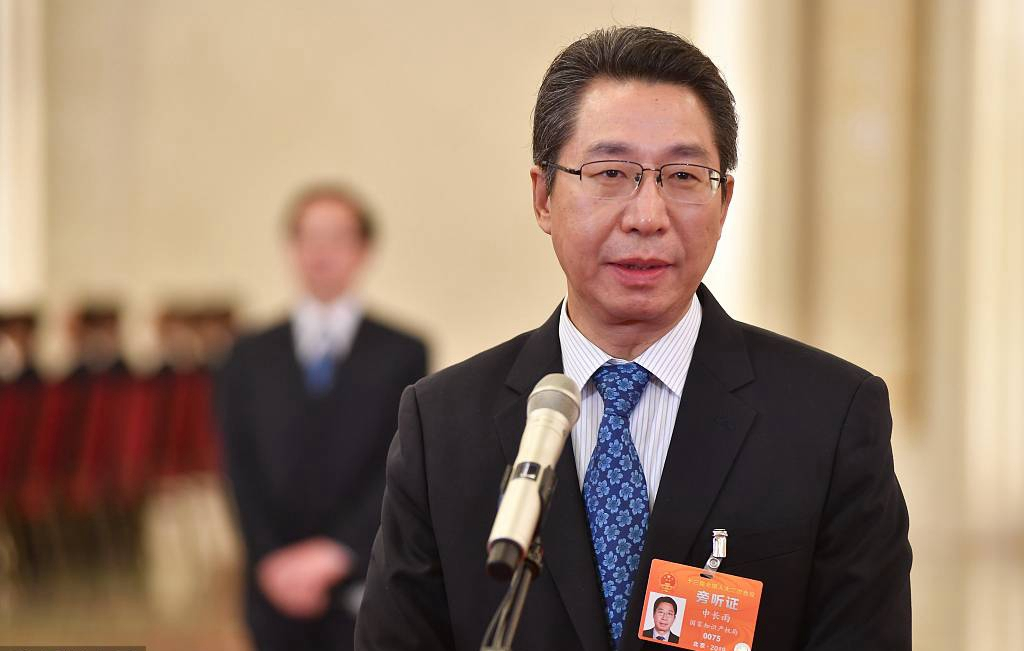
Domestic
08:55, 12-Mar-2019
China to step up IPR protection through pragmatic measures
Updated
14:49, 13-Mar-2019
CGTN
04:09

China will strengthen Intellectual Property Rights (IPR) protection and further innovate work mechanisms and models, said Shen Changyu, commissioner of China National Intellectual Property Administration on Tuesday.
Shen made the remarks in response to a question by CGTN reporter Tang Bo about the pragmatic measures being taken to protect IPR at the "Ministers' Corridor" before the third plenary meeting of the second session of the 13th National People's Congress (NPC), China's national legislature.
The authorities are working on an overall mechanism to achieve strict, widespread, fast and equal protection of IPRs, Shen said.
He noted that China will focus on improving the quality and efficiency of its IPR examination to strengthen protection from the very beginning.

Shen Changyu, commissioner of China National Intellectual Property Administration, takes questions at the "Ministers' Corridor" on the sidelines of the second session of the 13th NPC in Beijing, March 12, 2019. /VCG Photo
Shen Changyu, commissioner of China National Intellectual Property Administration, takes questions at the "Ministers' Corridor" on the sidelines of the second session of the 13th NPC in Beijing, March 12, 2019. /VCG Photo
Last year, China shortened the trademark examination period from eight months to six months, and this year further efforts will be made to achieve the goal of reducing it to five months.
Meanwhile, the examination period for high-value patents will be further cut by 15 percent following the 10 percent reduction achieved last year, he noted.
China will also improve relevant laws and regulations.
"We will actively cooperate with the NPC in revising the Patent Law and establish a punishment system for infringement, substantially raising the cost of infringement," said Shen.
In willful infringement cases, patent holders could be slapped with fines up to five times the estimated damage.
In 2018, Chinese courts at all levels concluded 288,000 cases related to IPR, up 41.8 percent year-on-year, according to a work report of the Supreme People's Court (SPC).
At the same time, "We're exploring the establishment of overseas assistance centers for IPR," Shen said, in a bid to ensure that China's IP can be effectively protected abroad.
The working mode and mechanism will be further innovated, with the aid of the Internet.
By implementing the "Internet Plus IPR," the protection can be tightened through source tracing, online identification and real-time monitoring.
Another group of IPR protection centers can be expected, Shen added, to form a coordinated and integrated mechanism for providing the public with more convenient and efficient, and less costly channels to safeguard rights.

China is taking measures to make IP a driving force for its economic development. /VCG Photo
China is taking measures to make IP a driving force for its economic development. /VCG Photo
In response to another question about IP commercialization, Shen said that four major measures are being taken to make IP a driving force for economic development.
China will foster and expand patent-intensive industries, including smart manufacturing, biomedicine, and new-generation mobile communications.
On trademarks, he said: "We will guide enterprises to pay more attention to brand cultivation."
As a country with a vast territory, rich resources and diverse cultures, China will boost economic development with regional characteristics.
The country will also strengthen international cooperation to promote technological and trade exchanges between Chinese and foreign enterprises.
Last year, China's expenditure on international intellectual property royalties exceeded 230 billion yuan (34 billion U.S. dollars), up by more than 20 percent over the previous year. Over the same period, it earned 37 billion yuan from selling IP royalties, up nearly 15 percent year-on-year, Shen added.

SITEMAP
Copyright © 2018 CGTN. Beijing ICP prepared NO.16065310-3
Copyright © 2018 CGTN. Beijing ICP prepared NO.16065310-3